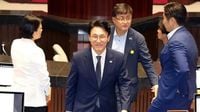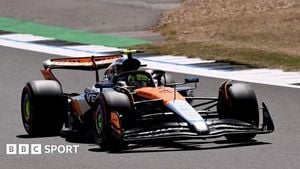On July 3, 2025, South Korea's National Assembly officially approved Mr. Kim Min Seok as the new Prime Minister, marking a significant moment in the country’s political landscape. The vote was overwhelmingly in favor, with 173 members supporting his appointment, only 3 opposing, and 3 invalid votes out of 179 present. This decisive endorsement reflects strong parliamentary confidence in Kim Min Seok’s leadership as he steps into one of the highest offices in the Republic of Korea.
At 61 years old, Kim Min Seok brings a wealth of political experience and strategic acumen to his new role. He is widely recognized for his instrumental part in President Lee Jae Myung’s election campaign, where his strategic insights helped shape a successful bid for the presidency. Following President Lee’s inauguration in June 2025, he promptly nominated Kim Min Seok as Prime Minister, entrusting him with the responsibility to steer the government forward.
The appointment was met with warm congratulations from neighboring Vietnam. On July 4, 2025, Vietnamese Prime Minister Pham Minh Chinh sent a formal message of congratulations to Mr. Kim Min Seok, acknowledging his new position as head of the South Korean Cabinet. This gesture highlights the close diplomatic ties and mutual respect between the two countries, underscoring the importance of regional cooperation in East Asia.
Kim Min Seok’s rise to the premiership comes at a pivotal time for South Korea. The nation is navigating complex domestic and international challenges, from economic pressures to geopolitical tensions in the region. His proven strategic skills and political savvy are expected to be critical assets in addressing these issues. Observers note that his close working relationship with President Lee Jae Myung could facilitate a more unified and effective government agenda.
In addition to the recent appointment, the South Korean political scene is already gearing up for the upcoming presidential election. On May 2, 2025, Han Duck Soo, the former acting President and Prime Minister, announced his intention to run for the presidency. Han Duck Soo’s candidacy introduces a seasoned veteran into the race, promising a competitive and closely watched election cycle ahead. His experience in both the presidency and premiership positions him as a formidable contender, adding a dynamic layer to the political environment that Kim Min Seok will now help navigate as Prime Minister.
Kim Min Seok’s confirmation by the National Assembly was a testament to his broad support across the political spectrum. The near-unanimous vote suggests that lawmakers see him as a capable leader who can manage the complexities of governance during a period marked by rapid change and uncertainty. His tenure will likely focus on sustaining economic growth, enhancing South Korea’s global standing, and maintaining stability in the face of regional security challenges.
Vietnam’s prompt congratulatory message from Prime Minister Pham Minh Chinh not only signifies diplomatic goodwill but also reflects the strategic importance of the South Korea-Vietnam relationship. Both nations have been deepening ties through trade, cultural exchange, and political dialogue. The partnership is seen as vital for fostering peace and prosperity in the broader Asia-Pacific region.
Kim Min Seok’s background in political strategy and campaign management is expected to influence his governance style. Known for his analytical approach and ability to build consensus, he may prioritize collaborative policymaking and pragmatic solutions. His leadership will be critical in supporting President Lee Jae Myung’s vision and navigating the complex legislative landscape.
As South Korea prepares for the upcoming presidential election, the political atmosphere is charged with anticipation. Han Duck Soo’s entry into the race signals a competitive contest that could shape the country’s direction for years to come. Meanwhile, Kim Min Seok’s role as Prime Minister will be central in managing current affairs and ensuring governmental continuity during this transitional period.
In summary, the appointment of Kim Min Seok as South Korea’s Prime Minister marks a significant development in the nation’s political trajectory. With strong parliamentary backing and regional recognition, he steps into a role that demands both strategic vision and practical leadership. As the country faces domestic challenges and an evolving geopolitical landscape, his premiership will be closely watched by both citizens and international partners alike.




